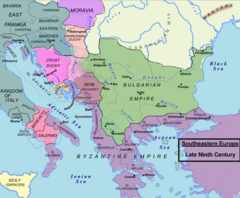
Back القديس نعوم ARZ Навум Охрыдскі Byelorussian Наум Охридски Bulgarian Naum Ohridski BS Naüm d'Ocrida Catalan Svatý Naum Czech Naum German Naum de Preslav Spanish Naum d'Ohrid French נאום (קדוש נוצרי) HE
Saint Naum | |
|---|---|
 Icon of Saint Naum | |
| Wonderworker, Apostle of the Slavs | |
| Born | c. 830 Moesia, First Bulgarian Empire[1] |
| Died | December 23, 910 Ohrid, First Bulgarian Empire, (present-day North Macedonia) |
| Venerated in | Eastern Orthodox Church, Eastern Catholic Churches, Latin Church |
| Major shrine | Monastery of Saint Naum in Ohrid (Sveti Naum) |
| Feast | 5 January and 3 July (Julian calendar), 20 May and 23 December (Revised Julian calendar, Gregorian calendar) |


Naum (Bulgarian and Macedonian: Свети Наум, Sveti Naum, also known as Naum of Ohrid or Naum of Preslav (c. 830 – December 23, 910), was a medieval Bulgarian writer and missionary among the Slavs, considered one of the Seven Apostles of the First Bulgarian Empire.[2][3][4][5][6] He was among the disciples of Cyril and Methodius and is associated with the creation of the Glagolitic and Cyrillic script. Naum was among the founders of the Pliska Literary School. Afterwards Naum worked at the Ohrid Literary School. He was among the first saints declared by the Bulgarian Orthodox Church after its foundation in the 9th century. The mission of Naum played significant role by transformation of the local Early Slavs into Bulgarians.[7]
- ^ Likewise, Clement and Naum, the first born in Moesia and the second with family ties in both Moesia and Dalmatia, escaped for safety to Belgrade, capital of Moesia Prima, then in Bulgaria. For more: Eurasian Studies Yearbook, Volume 70, Eurolingua, 1998, ISBN 0931922623, p. 56.
- ^ The early medieval Balkans: a critical survey from the sixth to the late twelfth century, John Van Antwerp Fine, University of Michigan Press, 1991, ISBN 0-472-08149-7, p. 128.
- ^ Obolensky, Dimitri (1994). Byzantium and the Slavs. St Vladimir's Seminary Press. pp. 48–49. ISBN 0-88141-008-X.[1]
- ^ Monks and Laymen in Byzantium, 843-1118, Rosemary Morris, Cambridge University Press, 2003, ISBN 0-521-31950-1, p. 25.
- ^ Historical dictionary of the Republic of Macedonia, Dimitar Bechev, Scarecrow Press, 2009, ISBN 0-8108-5565-8, p. 159.
- ^ The national question in Yugoslavia: origins, history, politics, Cornell Paperbacks: Slavic studies, history, political science, Ivo Banac, Cornell University Press, 1988, ISBN 0-8014-9493-1, p. 309.
- ^ John Van Antwerp Fine, The Early Medieval Balkans: A Critical Survey from the Sixth to the Late Twelfth Century, University of Michigan Press, 1991, ISBN 0472081497, pp. 127-128.
© MMXXIII Rich X Search. We shall prevail. All rights reserved. Rich X Search